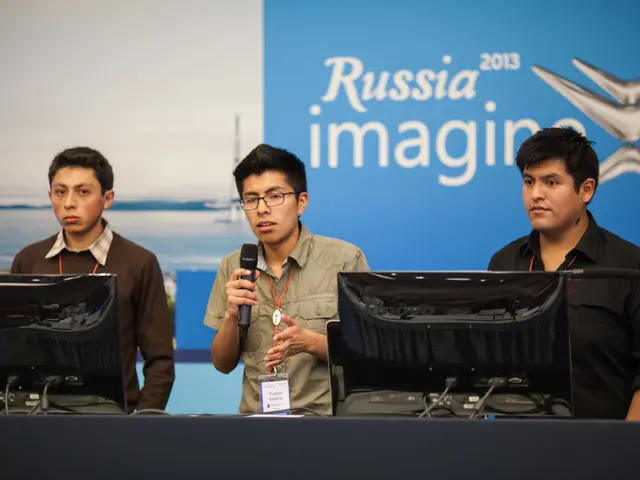Autonomous charging robots have become the focus of Carnet's investment, as the company explores if these robots can address the issue of limited charging station availability.
In the realm of electric vehicle (EV) innovation, the EVOSS project, spearheaded by the Barcelona-based think tank CARNET, is making waves. The project introduces autonomous charging robots (RCD) for electric vehicles, designed to optimise space in car parks and reduce costs associated with implementing chargers.
CARNET, a leading organisation specialising in transport and automotive science and technology, is driving this change. The organisation is working closely with industry partners, including SEAT SA in Martorell and Volkswagen Group Innovation in Wolfsburg, Germany.
The autonomous charging robots, equipped with high-capacity batteries and fast DC charging plugs, navigate to parked electric vehicles, connect, and begin charging without the need for additional fixed installations. This groundbreaking technology is currently being tested through two pilot trials in Tel Aviv and Thessaloniki.
Meanwhile, the Spanish Association of Automobile and Truck Manufacturers (ANFAC) reports a 10% increase in public access charging points in Spain, now totaling 35,698. However, it's worth noting that the number of inactive charging stations has risen by 5.8%, reaching 9,145 chargers.
CARNET's focus on innovation and technology surveillance extends beyond the EVOSS project. The organisation is also driving the SELECTIVE project, developed in collaboration with Škoda and other partners. This project promotes the installation of charging points in private parking spaces.
Users in Madrid and Prague have already benefited from this innovation, with the ability to rent parking spaces equipped with Halo chargers through the Charge Amps app. This service allows users to manage charging schedules and make payments directly.
CARNET's ambition doesn't stop here. The organisation is planning to launch Botnet and other pilots in collaboration with the start-up Vaivé Logistics, a CARNET spin-off. The trials aim to validate the system's ability to improve the availability and accessibility of chargers in urban areas.
As CARNET continues to advance technologies in the field of urban mobility, it is also fostering collaboration between industry, academia, and administrations. The organisation is working closely with its European counterparts to advance in the field of transport and automotive science and technology.
One of CARNET's standout projects is the ADD (Autonomous Delivery Device), which began as a collaboration with VW, resulting in the manufacturing of the prototype Ona. This project signifies CARNET's commitment to electric and sustainable transport, a commitment that is evident in the EVOSS project and its autonomous charging robots.
Read also:
- MRI Scans in Epilepsy Diagnosis: Function and Revealed Findings
- Hematology specialist and anemia treatment: The role of a hematologist in managing anemia conditions
- Enhancing the framework or setup for efficient operation and growth
- Hydroelectric Power Generation Industry Forecasted to Expand to USD 413.3 Billion by 2034, Projected Growth Rate of 5.8% Compound Annual Growth Rate (CAGR)








